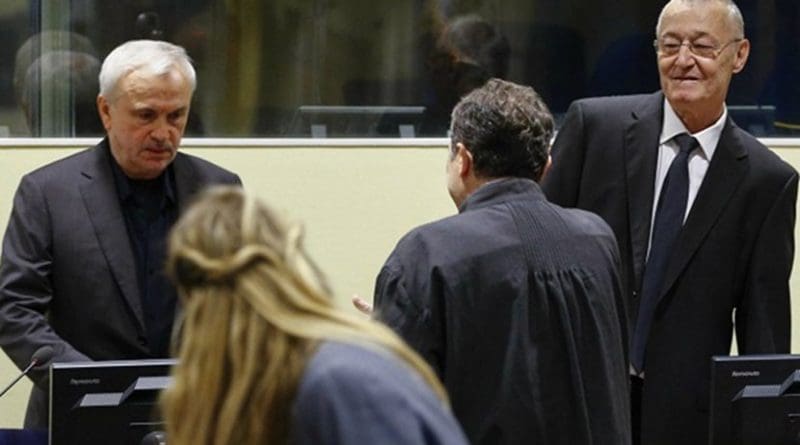Serbian Policeman Admits Burning Homes In Bosnia
By Radosa Milutinovic
Testifying at the Hague trial of former Serbian State Security chiefs Jovica Stanisic and Franko Simatovic, a Serbian ex-policeman admitted personally setting houses on fire in a Bosniak village in 1993.
Testifying as a protected prosecution witness, the former Serbian policeman told Jovica Stanisic and Franko Simatovic’s trial at the Mechanism for International Tribunals in The Hague on Thursday that he was involved in a “clean-up” operation in villages near the small town of Skelani in eastern Bosnia in March 1993, when houses were torched.
“I burned one or two houses at most, in the Ljeskovik village area,” said the protected witness, codenamed RFJ-083 to conceal his identity.
He said that participated as a member of Serbian Interior Ministry special police units, but that the operation was led by the Serbian State Security Service’s Red Berets unit, “managed” by defendant Simatovic.
Stanisic, the former chief of the Serbian State Security Service, and his former assistant Simatovic are on trial for persecution, murders and deportations during the wars in Croatia and Bosnia and Herzegovina.
According to the charges, the Red Berets were under the control of the Serbian State Security Service.
The indictment alleges that Stanisic and Simatovic committed their crimes as part of a joint criminal enterprise aimed at forcibly and permanently removing Croats and Bosniaks from large parts of Croatia and Bosnia and Herzegovina, which would then be incorporated into a unified Serb state.
During cross-examination, Simatovic’s defence lawyer Vladimir Petrovic asked the witness who gave the order to set the houses on fire.
“It happened spontaneously, everyone was doing it. I don’t know who ordered it, but it was done,” RFJ-083 said.
The witness said that, while following the Red Berets, his special police unit participated in the burning of the villages of Ljeskovik, Osmace and Karacici, near Skelani.
While they were in Bosnia, the Serbian special policemen followed the Red Berets’ instructions and orders, he testified.
However he confirmed that the Bosniaks who lived in the villages had already left before the Red Berets arrived.
RFJ-083 said that, during his 12-day stay in Bosnia, he neither saw the enemy or the Bosniak population, nor fired a single bullet, because he and his colleagues offered “background support” to the Red Berets and did not participate in their operations.
Simatovic’s lawyer argued that the Red Berets unit was part of the Bosnian Serb Interior Ministry, not under the control of the Serbian State Security Service at the time.
He presented to the court an order from Bosnian Serb Interior Minister Mico Stanisic which appointed Radojica Bozovic commander of the Red Berets.
The witness, who said that Red Berets members had told him their commander was “a man named Bozovic”, accepted that, according to the document, Bozovic received orders from the Bosnian Serb Interior Ministry.
Stanisic and Simatovic both pleaded not guilty in December 2015 after the appeals chamber of the International Criminal Tribunal for the Former Yugoslavia overturned their acquittal in their first trial.
The appeals chamber ruled that there were serious legal and factual errors when Stanisic and Simatovic were initially acquitted of war crimes in 2013, and ordered the case to be retried and all the evidence and witnesses reheard in full by new judges.
The trial continues on Tuesday.

